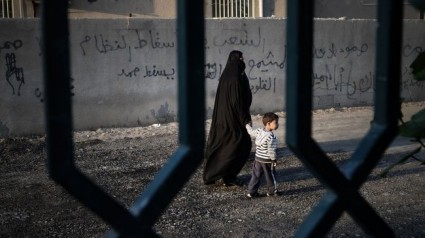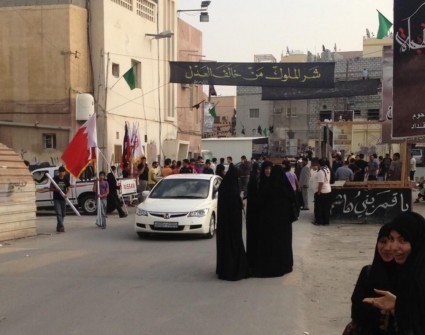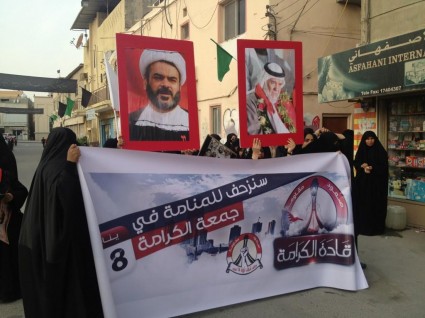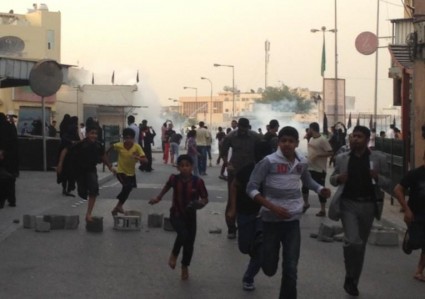Obama’s Chickens Come Home to Roost, America, Bloody America
January 9, 2013 No Comments
Bahrain Human Rights group under seige with continued unjust arrest and detention of its Officers
Bahrain: Extended Detention for HRD Said Yousif Al-Muhafdha for Exposing Human Rights Violations During a Protest Via Twitter
9 January, 2013 – Bahrain Center for Human Rights
Said Yousif Al-Muhafdhah, human rights defender and the Acting Vice President and Head of Documentation Unit of the Bahrain Center for Human Rights (BCHR), was arrested while monitoring a protest in Manama on 17 Dec 2012 and tweeting about the attacks on protesters and violations to their rights. On 18 Dec 2012 he was sent to the public prosecution where he was interrogated on the charge of “disseminating false news over twitter”. He received a detention order of 7 days pending investigation. On the end of his 7-day detention, the public prosecution extended his detention for another 14 days. Today (9th of January, 2013) Al-Muhafdha stood in front of the Lower Criminal Court on, on the same charges, which is the same process that the President of the BCHR Nabeel Rajab went through before he was first sentenced to 3 years in prison. The Lower Criminal Court adjourned for another session on 17th Jan 2013 with continued imprisonment.
Said Yousif Al-Muhafdhah is being kept in Hoora police station , according to his family members. The BCHR believes that his detention is an attempt to prevent his work as a human rights defender where he has exposed many of the systematic human rights violations ongoing in the country.
The charges against Al-Muhafdhah’s of “disseminating false news over Twitter” claim that he published a photo of an injured protester, which was allegedly altered. The photo seen in a report mentioned by the BCHR http://bahrainrights.hopto.org/en/node/5582 was confirmed by members of the BCHR to have happened and was documented. The injured protester was being reviewed by several medical staff volunteers away from government hospitals fearing arrest.
In the lead-up to his arrest, Said Yousif Al-Muhafdhah wrote through his Twitter account @SAIDYOUSIF about statements and accusations made by high officials in the Bahraini regime, as well as prominent members of society, that were found by the Bahrain Independent Commission of Inquiry (BICI), international human rights organizations, or local independent investigations to be not true, and consequently caused enormous damage to the society in Bahrain.
Some of the authority figures and government agencies that Said Yousif mentioned in his postings, and were found by the (BICI) or other independent investigations to be disseminating false news, are:
• The Minister of Justice and Islamic Affairs: Khalid Bin Ali Al-Khalifa
• The Minister of Social Affairs: Fatima Al-Balloshi
• The Ministry of Interior official twitter account
• The Bahrain Information Affairs Authority official twitter account
The false news published by these officials were in the form of: official statements, personal statements, press conferences, photos and video publications.
None of the authority figures or government agencies mentioned above or any other figure of authority working for the Bahraini government, or in support of the authorities, has been investigated or held accountable for the damages caused to the Bahraini people and Bahraini society by disseminating false news.
The BCHR believes that Said Yousif Al-Muhafdhah has been targeted in this campaign of judicial harassment mainly due to his human rights activities in reporting and documenting human rights violations and that his arbitrary detention is intended to suspend these legitimate activities, at a time that other leading human rights defenders are also imprisoned including the co-founder of the BCHR and the GCHR Abdulhadi Al-Khawaja, and the President of the BCHR and the Director of GCHR Nabeel Rajab.
January 9, 2013 No Comments
The Betrayal of Democracy, President Obama’s failed policy on Bahrain
‘Forsaken by the West’: Obama and the Betrayal of Democracy in Bahrain
By Larry Diamond – 9 January, 2013 – The Atlantic
Of the half dozen Arab states that were shaken by popular demands for democracy when the Arab Spring erupted two years ago, Bahrain is the easiest to forget. In sharp contrast to Tunisia, Egypt, Libya, and Yemen — where dictators were toppled — (or even Syria, with its ongoing civil war), Bahrain’s authoritarian monarchy has crushed the democratic opposition. Of the six countries gripped by revolutionary fervor, Bahrain is the smallest in size and population, with most of its 1.3 million people (nearly half of them non-citizens) crowded onto an arid, largely barren island about a third the size of Rhode Island. It is not nearly as rich as its small Gulf neighbors, Kuwait and the United Arab Emirates, and its oil exports now rank a paltry 48th in the world. Among the states of the Arab Middle East, Bahrain may be the most dependent on a powerful neighbor, Saudi Arabia — which intervened militarily in March 2011 to rescue the besieged and deeply unpopular al-Khalifa monarchy.
But along with its mounting problems, Bahrain has a geostrategic trump card: location. Jutting out in the center of the Persian Gulf, less than 100 miles from Iran, it hosts the U.S. Fifth Fleet, the pillar of naval security in the region and an indispensable counterweight to Iran’s ambitions for regional hegemony.
Thus, Bahrain is a major strategic ally of the United States. And so, the active mobilization into the streets of more than a quarter of Bahrain’s entire citizenry became what Al Jazeera called “the Arab revolution that was abandoned by the Arabs, forsaken by the West, and forgotten by the world.”
The United States has from time to time issued statements of concern about arrests and convictions, but always couched in the politesse of a big power with bigger issues to address.
Since Bahrainis first took to the streets on February 14, 2011 to demand revision of the constitution and a transition to democracy, the United States has faced an acute and painful instance of the classic tension between security interests and moral concerns. Deeply insecure over its minority status as a Sunni Muslim monarchy reigning over a Shia Muslim majority, the Al Khalifa regime responded to the peaceful protests at the Pearl Roundabout in the capital, Manama, with force. On “Bloody Thursday,” February 17, King Hamad’s security forces raided the protestors in the dead of night, killing four and injuring some 300.
Initially, the protestors had demanded “merely” freedom, democracy, and equality (which could have preserved the monarchy on a new constitutional basis, with limited powers). Even many Bahraini Sunnis (from outside the privileged royal elite) rallied to this campaign for accountability and justice. In particular, Bahrain’s Shia majority was tired of living as second-class citizens, utterly marginalized in the distribution of power and wealth. The contrast between their hard-scrabble, high-density housing settlements and the extravagant grounds and palaces of the royal family had already been vividly documented. Five years earlier, Bahraini activists used Google Earth to display dozens of satellite images of royal properties, many of them private islands, replete with palaces, lavish swimming pools, lush gardens, yachts, and even a private golf course, race track, and hunting ground. Nevertheless, a power-sharing deal could probably have been worked out if the regime had responded to the 2011 protests with negotiations rather than repression. After all, King Hamad had assumed the throne in 1999 as something of a political reformer; he and his Crown Prince were said to remain inclined toward flexibility; and the formal architecture of an elected parliament had allowed the moderate Shia political society, Al Wefaq, to win 18 of the 40 seats in the lower house as recently as 2010.
If political reform and a negotiated settlement were an option when the protests broke out in February 2011, they were not so in the mind of the Saudi monarchy — or its hardline Bahraini allies like the prime minister and the chief of the royal court. The Saudi regime is deeply anxious about stability in its own oil-rich Eastern Province, where most of its roughly three and half million Saudi Shia are located, and where the Shia form a population majority. For the House of Saud, the prospect of a Shia-dominated government in Bahrain must have raised the specter of escalating demands for equality and dignity from Saudi Arabia’s own Shia minority.
The Democracy ReportBahrain’s Bloody Thursday cleared the Pearl Roundabout but only inflamed popular anger. Five days later, over 100,000 Bahrainis (nearly 15 percent of the indigenous population) took part in a march to honor the protestors who had been killed. As the protests escalated in size and intensity, King Hamad offered modest concessions, but too modest and too late. By then, Bahrain’s aroused majority would settle for nothing less than a purely constitutional monarchy, and militants were calling for an end to the monarchy altogether. As protests escalated further in March 2011, the monarchy called upon the Saudi-dominated Gulf Cooperation Council for assistance. In the early morning of March 17, 5,000 troops, backed up by tanks and helicopters, routed the demonstrators who had returned to the Pearl Roundabout. More than a thousand were arrested, including several leaders of the Haq Movement, which had split off from Wefaq in protest against the 2002 constitution and the latter’s decision to participate in elections. Among the arrested Haq leaders were its head, Hassan Mushaima, and a mild-mannered engineering professor and human rights activist, Abduljalil al-Singace. …more
January 9, 2013 No Comments
al-Qaeda closer to establishing Chemical Weapons State as Saudi Arabia, Egypt call for Assad to Quit
Saudi Arabia, Egypt Call for Peaceful Handover in Syria
By Maher Chmaytelli, Carter Dougherty – 5 January, 2013 – Bloomberg
Saudi Arabia and Egypt yesterday called for a “peaceful handover” of power in Syria, signaling closer cooperation as violence mounts with more than 60,000 people reported killed since the protests against President Bashar al-Assad began nearly two years ago.
“A peaceful exit is an Arab and international demand,” Saudi Foreign Minister Prince Saud Al-Faisal told reporters yesterday in Riyadh after talks with his Egyptian counterpart, Mohamed Kamel Amr. “It is up to the Syrian people to decide the conditions of the exit from power” of Assad.
Amr called for “stepping up the efforts to achieve a peaceful handover of power.” Assad will address his nation today to discuss developments in the region, according to Syrian state television.
Saudi Arabia, the largest Arab economy, and Egypt, the most populous Arab state, for the first time made a joint call for Assad to step down, signaling closer cooperation on the Syrian situation, Khalid al-Dakhil, a professor of political studies at King Saud University in Riyadh, said.
“They see how important the fall of the Syrian regime is on an Arab and regional level,” he said in a telephone interview.
Saudi Arabia stayed away from a foreign ministers’ meeting on Syria held in September in Cairo at the invitation of Egyptian President Mohamed Mursi, with the participation of Shiite Iran, which supports Assad, a member of the Alawite sect affliated with Shiite Islam, and Turkey, which supports the rebellion. Participants failed to agree on a compromise.
Region’s Future
With the future of the Assad regime in doubt, analysts have begun contemplating how his fall might affect a region upended by the two years of uprisings — some democratic and peaceful, others violent — referred to as the Arab Spring.
Anne-Marie Slaughter, a professor at Princeton University and former U.S. State Department official, predicted that Syria would “split into multiple regions” and that, even if Assad falls, there won’t be a government to replace him by the end of this year.
“You’re going to have a Kurdish autonomous zone in Syria that is going to create major trouble for Turkey,” Slaughter said in taped remarks on CNN’s “Fareed Zakaria GPS” program scheduled for broadcast today. Turkey has a substantial population that is ethnically Kurdish.
The refugee flow from the Syrian civil war is “already starting to destabilize Jordan just in terms of inability to cope,” Slaughter said. Lebanon faces Syrian-inspired conflict between Assad’s Alawites and Sunni Muslims, she said. …more
January 9, 2013 No Comments
Yes Son, it’s the sound of a Kingdom falling…
January 9, 2013 No Comments
Saudi Arabians pay the price with their blood against regime brutality and tens of thousands as Political Prisoners
Saudi Arabia witnessed 52 protests in 2012: Activists
5 January, 2013 – PressTV
Saudi protesters have staged over 50 anti-regime demonstrations across the kingdom in 2012 to demand the immediate release of political prisoners, activists say.
Calling 2012 the year of protests, political activists said in a report that the kingdom witnessed 52 protest rallies last year without taking into account demonstrations held in Eastern Province.
They say protest had a big impact on the Al Saud regime as it was forced to release some political prisoners.
Saudi activists say there are more than 30,000 political prisoners, mostly prisoners of conscience, in jails across the Kingdom.
According to the activists, most of the political prisoners are being held by the government without trial or legitimate charges and they were arrested for merely looking suspicious.
Some of the detainees are reported to be held without trial for more than 16 years. Attempting to incite the public against the government and allegiance to foreign entities are usually the ready-made charges brought against political dissidents.
Since February 2011, protesters have held demonstrations on an almost regular basis in Saudi Arabia, mainly in Qatif and Awamiyah in Eastern Province, primarily calling for the release of all political prisoners, freedom of expression and assembly, as well as an end to widespread discrimination.
However, the demonstrations turned into protests against the repressive Al Saud regime, especially after November 2011, when Saudi security forces killed five protesters and injured many others in the province. …source
January 9, 2013 No Comments
Syria in the abyss, the dialogue of impossibility and ruin
President Assad propose a Syrian and a sovereign plan… to those who want to listen
7 January, 2013 – By Pierre Khalaf – Voltaire.net
The timing chosen by President Bashar al-Assad to propose a plan to end the crisis is not trivial. It coincided, first, with successive defeats for the armed groups, which destroyed the illusions of the United States and its European and Arab auxiliaries, distorting all their calculations, and then with information about a Russian-American meeting, mid-January, to discuss the results of the last visit to Syria of the international envoy, Lakhdar Brahimi. Mr Brahimi has already heard from President Assad the headlines of the principles that he has developed Sunday at the House of Culture and Arts, in a speech, in presence of hundreds of enthusiastic supporters. These inalienable principles include the following: the sovereignty and political independence of Syria are not negotiable, therefore, Damascus will not accept any condition imposed from outside; any solution must reflects the will of the Syrians.
In his first speech since June 3, 2012, Mr. Assad was inflexible, ensuring that the conflict was not between the government and the opposition, but between “the Nation and its enemies” who want the partition of the country. Claiming not to have found so far a “partner” for this and refusing to negotiate with “gangs who take their orders from abroad”, he proposed a three-stage plan. But before any dialogue, countries funding terrorists should “commit to stop”, and armed men to put an end to their terrorist operations, he said, denouncing “a state of war in all sense of the word”. Once these commitments achieved, the army will immediately cease its operations, “while retaining the right to respond,” he added.
Only under these conditions a “national dialogue conference” will be opened, he said. This conference will prepare a “National Charter” to be submitted to referendum and a new parliament and a new government will emerge from the polls. Any transition must “be done according to the terms of the constitution,” he said, referring to elections.
Mr. Assad plan therefore provides three stages, which should soon be officially presented by the government to be included in a “National Charter” to be drafted by all parties before being submitted to a referendum:
Step 1: Countries arming terrorists undertake to stop the funding; cessation of terrorists operations, will help the return of refugees, and then, the Syrian army will immediately put an end to its operations, while retaining the right to respond to threats against national security; setting up a mechanism to monitor stakeholder engagement, including with regard to border control.
Step 2: Held under the auspices of the government, a conference of national dialogue involving all forces, will draft a National Charter defending the sovereignty of Syria, unity and territorial integrity, and rejecting interference, terrorism and violence. This charter must then be submitted to a referendum; parliamentary elections followed by the formation of a government extended to all segments of society, in accordance with the Constitution, in charge of enforcing the National Charter.
Step 3: Formation of a government under the Constitution; a conference of national reconciliation and general amnesty for all persons detained as a result of events; infrastructures rebuilding.
As President Assad expected, the so-called opposition represented by the Syrian National Coalition immediately rejected the plan, saying that the President wants to choose its partners and seek to stay in power. The Coalition spokesman, Walid al-Bunni, told AFP in Beirut that the opposition wanted “a political solution, but the goal is for the Syrians to overthrow (Mr. Assad)”.
President Assad said that anyway, this plan was not directed to “those who will reject it immediately, but to the true patriots who have Syria’s interests in mind”. “It is useless to argue with those who take their orders from abroad, it is best to speak directly with the master rather than the slave”, he said on Sunday.
The Assad initiative comes as the United States seem to have resigned to the failure of all the pressures, sanctions and military offensives for the departure of the Syrian President. On December 29, Russia said Assad intended to remain in power until the end of his term and it was impossible to dissuade him.
During his visit to Damascus late December, Lakhdar Brahimi spoke of a plan “based on the Geneva Declaration,” providing for a cease-fire, the formation of a government with full powers and elections. The Geneva Declaration dated June 2012 provided for a transitional government but did not refer to the departure of Mr. Assad. Mr. Brahimi found this plan likely to be accepted by the international community. Damascus responded by saying welcome any initiative through dialogue.
After several meetings between Moscow and Washington, and several rounds of Mr. Brahimi, the diplomatic ballet intensifies in the region. Riyadh and Cairo have called for a “peaceful settlement” defined by the Syrians themselves. The head of the Iranian diplomacy goes for its part January 9 to Cairo, to meet the Egyptians and Mr. Brahimi. …more
January 9, 2013 No Comments
Obama policy on Bahrain, Saudi Arabia is Heresy toward Democracy and Human Rights
Obama Should Reconsider US Approach to Bahrain
Toby C. Jones – LobeLog – 8 January, 2013
Justice is a fiction in much of the Persian Gulf. Nowhere is this truer than in Bahrain, a place where torture and state terror have become the norm. The country’s political elites talk frequently about freedom and the need for legal and political order. The reality, however, is that Bahrain’s judicial system is little more than theater. The courts are sites in which freedoms are not assured, but where they are subordinated to the whims of centralized tyranny. Over the last two years, Bahrain has blithely ignored almost all of its domestic and international commitments to refrain from torture, to protect free speech and to honor due process, all conventions that the country has ostensibly built into its “constitutional” order.
In the most recent instance, the country’s highest court upheld lengthy prison sentences for 13 prominent human rights and political activists, including life imprisonment in some of the world’s most brutal dungeons. Having already been subjected to late night abductions, military tribunals, torture, and false accusation, it is hardly surprising that the imprisoned were unable to find relief in Bahrain’s sham appeals process.
More remarkable is the unwillingness of Bahrain’s most important Western patron, the United States, to openly acknowledge that its partner and host to the 5th Fleet is not merely managing its way through a crisis, but building a regime of fear and violence all while claiming the opposite. In her comments yesterday at the State Department’s daily briefing, spokesperson Victoria Nuland offered what has become a familiar refrain — a mild rebuke dressed up in principle, but one that makes clear that the US is unwilling to say or do more.
The US position on Bahrain’s excesses, in ways that are eerily similar to the island country’s own theatrical posturing, is more histrionic than substantive. Clearly, in spite of their claims otherwise, American leaders are mostly content with the status quo. Nuland expressed “regret” and “concern” about Bahrain’s high court’s decision to uphold the convictions of key opposition figures yesterday. She added “that this decision further restricts freedom of expression and compromises the atmosphere within Bahrain for reconciliation.”
The reality is that there is nothing further to restrict. The only clear willingness for reconciliation has come from the country’s opposition, not the government. In also calling for further investigations into torture and accountability, Ms. Nuland asks her listeners to suspend disbelief and to consider seriously that Bahrain has any real interest in the pursuit of a meaningful resolution. It has been clear for two years that Bahrain’s leaders desire victory and vengeance, the total destruction of the democratic opposition.
While American leaders almost certainly would prefer a political resolution to Bahrain’s challenges, they have done little to help advance the cause. Bahrain’s leaders have learned that mild admonishment is a small price to pay while they consolidate a new era of authoritarianism. They understand that the American approach is feeble and feckless, if often justified, because of Bahrain’s strategic significance. Long a reliable partner in the US mission to police and patrol the Persian Gulf and to ensure the “flow of oil,” American unwillingness to come down too hard on Manama is also a sign of deference to Riyadh. Saudi Arabia has little interest in seeing Bahrain’s opposition enjoy political gain.
It is, however, well past time to think seriously about whether US strategy in the Gulf is working or, instead, whether it helps abet the very conditions of instability that threaten the region and prospects for more open and durable regional politics. The reality is that oil’s flow does not need protecting. Bahrain does not deserve a pass because it is home to American military facilities. …more
January 9, 2013 No Comments
USG disrespects ITUC on Bahrain Labor Rights, tramples Free Trade Agreement with inaction on KOB violations
ITUC Calls on Bahrain to Make Progress on Labour Rights
9 January, 2013 – Press Release: ITUC
INTERNATIONAL TRADE UNION CONFEDERATION
Brussels, 8 January 2013 (ITUC OnLine): The ITUC is urging the US government to follow through on a US Department of Labor report which has found that Bahrain violated labour commitments made under the Free Trade Agreement (FTA) between the two countries. The long delayed report, issued on December 20, made a series of recommendations to be taken up in formal consultations between the two governments, including enacting substantial labour law reforms, ensuring that workers be unconditionally reinstated with back pay, reviewing all criminal cases against trade unionists and dropping charges where appropriate and refraining from any further activities that would undermine trade unions, including the national trade union centre GFBTU.
“The U.S. government now must demonstrate that the consultations comprise a serious effort to address Bahrain’s blatant disregard for the trade agreement’s labor chapter, including punishing people at work for their peaceful participation in democracy marches,” according to the AFL-CIO, which filed the original complaint under the FTA in April 2011.
In February 2011, Bahrainis took to the streets to demand economic and social justice and democratic reforms. Trade unions, including the GFBTU (General Federation of Bahrain Trade Unions), played an important role in the protests and at one point called a general strike. The government’s reaction to the protests was swift and harsh, resulting in serious and widespread human rights violations. In light of this crisis, the AFL-CIO filed a complaint under the US-Bahrain Free Trade Agreement (FTA) in April 2011 calling on the United States to withdraw from the pact and, at the very least, to initiate consultations under the labour chapter regarding the sacking of thousands of trade union members and the arrest and prosecution of union leaders.
“In 2012, an ILO-led process produced important but incomplete progress in achieving justice for those who were victims of the labour repression committed by the government in response to the protests. That process has now stalled due to a lack of political will by the government and, indeed, it is again backsliding on its international commitments. This includes the recent sentencing of trade union leaders to lengthy prison sentences for their union activity,” said ITUC General Secretary Sharan Burrow. …more
January 9, 2013 No Comments
US policy broken or USG is complicit in Bahrain abuse as it repeats its “concern” about KOB rampant rights abuse
US Department of State Daily Press Briefing
Victoria Nuland – Spokesperson
Washington, DC – 7 January, 2013
QUESTION: Would you update us on your position to – or your reaction to the latest arrests and apparent heavy-handedness of the Bahraini Government against the opposition?
MS. NULAND: Well, as you know, there was a final ruling today in the Bahraini Court of Cassation on the 13 Bahraini activists. We regret today’s decision by the Bahraini Court of Cassation to uphold the convictions and the sentences of these 13 activists. We’re concerned that this decision further restricts freedom of expression and compromises the atmosphere within Bahrain for reconciliation. We have repeatedly voiced our concern about these cases both publicly and privately and at the highest levels, and urged the Government of Bahrain to abide by its international obligations, and we have also had Embassy observers at the trial. So we call on the Government of Bahrain to investigate all reports of torture, including those made by the defendants in this case, as it has pledged to do, and to hold accountable any who are found responsible.
…source
January 9, 2013 No Comments
Saudi Arabia, Bahrain, governments bumbling their way toward revolution by choosing brutality over democracy
January 9, 2013 No Comments
Bilad al-Qadeem residents gather then scatter at Political Prisoner Solidarity Protest
January 9, 2013 No Comments
Bahrain’s King Hamad named “Humanitarian Personality of the Year” gets accolades for “consolidating the pillars of democracy and freedom”

Bahrain king ‘awarded for democracy’
9 January, 2012 – Hurriyet Daily News
Bahrain’s King Hamad bin Isa Al Khalifa was named Humanitarian Personality of the Year with the absolute majority of votes in a recent poll conducted by the Kuwaiti daily newspaper Al-Sharq, according to Bahrain news agency.
The participants hailed the king for his role in “consolidating the pillars of democracy and freedom” and “successful tackling of all hostile plots intended to tamper with Bahrain’s independence and security and the freedom of its people,” said the agency.
The government is criticized for putting down an uprising with martial law in March 2011. Thousands were arrested and military trials conducted. Bahrain says it is now instituting a range of reforms. …source
January 9, 2013 No Comments

































